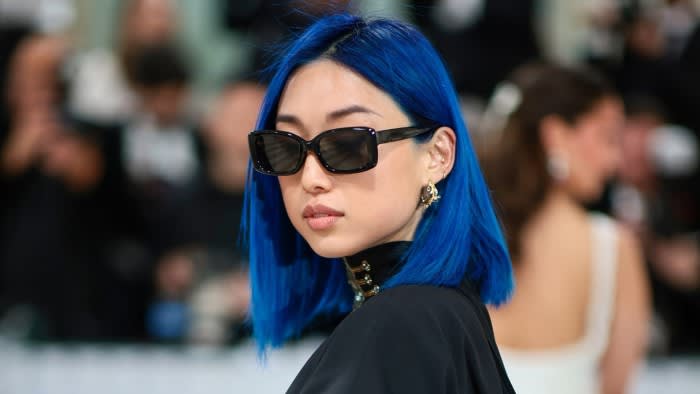
Unlock the Editor’s Digest for free
Roula Khalaf, Editor of the FT, selects her favourite stories in this weekly newsletter.
The editor in chief of Vogue China, Margaret Zhang, has left the publishing group in the latest senior departure from the fashion magazine and its US owner, media group Condé Nast.
Zhang, who became Vogue’s youngest editor when she was appointed two years ago, was seen as one of the rising stars of Condé Nast.
Her appointment was considered an important strategic move to target a younger, more digitally native audience in China, a fast growing market for fashion. However, she will leave the group after her contract ends next month, according to three people familiar with the situation.
Zhang — who often has brightly dyed hair — is a well known presence on the front row of fashion shows. She is also a noted fashion influencer, having been the first Asian face on the cover of Elle Australia, with more than 2mn followers on Instagram. She has also developed film projects and worked as a consultant and creative director.
The executive is expected to continue her business interests in areas such as consultancy and film, according to a person close to her plans.
During her time at Vogue, Zhang has been attacked on social media in China for being born in Australia, people familiar with her position said, despite counting both parents as ethnic Chinese.
One person familiar with the attacks on Zhang described them as “toxic”. They added that the attacks often amounted to her “not being Chinese enough” for the domestic market, adding that Condé Nast should have been more supportive following the abuse.
A person close to Condé Nast said management was never made aware of any serious threats.
Zhang has overseen initiatives to promote the country’s fashion industry, including bringing Vogue’s annual ‘Forces of Fashion’ conference to Shanghai for the first time.
Her departure will mark the latest senior executive to leave Vogue and Condé Nast over the past year, with some staff unhappy following a reorganisation of its businesses designed to position the group for a more digital audience.
This has left standardised global editions — Vogue’s UK edition, for example, will no longer have an editor-in-chief once Edward Enninful leaves next month. Instead, his replacement, Chioma Nnadi, is the head of editorial content, reporting to overall Vogue global editorial director Anna Wintour in New York.
Enninful is not the only departure from Vogue, with UK executives such as Vanessa Kingori and UK managing director Albert Read also leaving the group.
A message to the staff in China from Wintour sent on Friday evening after being contacted by the Financial Times confirmed “Margaret’s decision to transition to a new chapter in her career after many contributions at Vogue China”. Wintour said the group had started the search for a new Vogue China editor-in-chief adding: “It is my top priority to find a visionary new leader without delay.”
Condé Nast declined to comment.
Last year, the group said it would cut about 5 per cent of its staff, or about 270 employees, as it sought to cut costs given pressure on digital advertising and a decline in social media traffic.
Hundreds of union members held a strike last month in protest against the company’s negotiating position in making jobs cuts — a situation exacerbated by the decision to merge Pitchfork website with GQ magazine.


